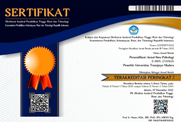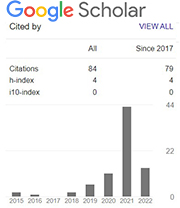Peran Resiliensi Terhadap Kecemasan Penyintas Covid-19
Abstract
Full Text:
PDF (Bahasa Indonesia)References
Ananda, A., Marsepa, E., Pratiwi, A., & Madani, U. Y. (2023). Hubungan dukungan keluarga dengan tingkat kecemasan pada penyintas covid-19 selama isolasi mandiri di wilayah desa kadu The Relationship Between Family Support and Anxiety Level of Covid-19 Survival During Self-Isolation in Kadu Village Area. Nusantara Hasana Journal, 2(8)
Brooks, S. K., Webster, R. K., Smith, L. E., Woodland, L., Wessely, S., Greenberg, N., & Rubin, G. J. (2020). The psychological impact of quarantine and how to reduce it: rapid review of the evidence. The Lancet, 395(10227), 912–920. https://doi.org/10.1016/S0140-6736(20)30460-8
Connor, K. M., & Davidson, J. R. T. (2003). Development of a new Resilience scale: The Connor-Davidson Resilience scale (CD-RISC). Depression and Anxiety, 18(2), 76–82. https://doi.org/10.1002/da.10113
Dar, S. A., Khurshid, S. Q., Wani, Z. A., Khanam, A., Haq, I., Shah, N. N., Shahnawaz, M., & Mustafa, H. (2020). Stigma in coronavirus disease-19 survivors in Kashmir, India: A cross-sectional exploratory study. PLoS ONE, 15(11 November). https://doi.org/10.1371/journal.pone.0240152
Elvinasari, R., Prihatin Idris, F., & Asrina, A. (n.d.). Journal of muslim community health (jmch) Pengetahuan dan Gangguan Umum Kejiwaan Penyintas COVID-19 Pada Saat Isolasi Di Wilayah Kerja Kecamatan Biringkanaya Kota Makassar. Journal of Muslim Community Health (JMCH) 2022, 3(3), 59–66. https://doi.org/10.52103/jmch.v3i3.986
Färber, F., & Rosendahl, J. (2018). OriginalArbeit: Zusammenhang von Resilienz und psychischer Gesundheit bei körperlichen Erkrankungen. Deutsches Arzteblatt International, 115(38), 621–627. https://doi.org/10.3238/arztebl.2018.0621
Hou, X. L., Wang, H. Z., Guo, C., Gaskin, J., Rost, D. H., & Wang, J. L. (2017). Psychological resilience can help combat the effect of stress on problematic social networking site usage. Personality and Individual Differences, 109, 61–66. https://doi.org/10.1016/j.paid.2016.12.048
Huang, Y., & Zhao, N. (2020). Generalized anxiety disorder, depressive symptoms and sleep quality during COVID-19 outbreak in China: a web-based cross-sectional survey. Psychiatry Research, 288. https://doi.org/10.1016/j.psychres.2020.112954
Jiao, W. Y., Wang, L. N., Liu, J., Fang, S. F., Jiao, F. Y., Pettoello-Mantovani, M., & Somekh, E. (2020). Behavioral and Emotional Disorders in Children during the COVID-19 Epidemic. In Journal of Pediatrics (Vol. 221, pp. 264-266.e1). Mosby Inc. https://doi.org/10.1016/j.jpeds.2020.03.013
Juli Andri, Padila, & Nur Afni Wulandari Arifin. (2021). 2167-Article Text-25472-1-10-20210629. Journal of Telenursing(JOTING), 3(1), 382–389.
Kang, H. J., Bae, K. Y., Kim, S. W., Shin, H. Y., Shin, I. S., Yoon, J. S., & Kim, J. M. (2017). Impact of anxiety and depression on physical health condition and disability in an elderly Korean population. Psychiatry Investigation, 14(3), 240–248. https://doi.org/10.4306/pi.2017.14.3.240
Karunathilake, K. (2021). Positive and negative impacts of COVID-19, an analysis with special reference to challenges on the supply chain in South Asian countries. Journal of Social and Economic Development, 23(S3), 568–581. https://doi.org/10.1007/s40847-020-00107-z
Lee, S. Y., Tung, H. H., Peng, L. N., Chen, L. K., Hsu, C. I., & Huang, Y. L. (2020). Resilience among older cardiovascular disease patients with probable sarcopenia. Archives of Gerontology and Geriatrics, 86. https://doi.org/10.1016/j.archger.2019.103939
Lim, K. K., Matchar, D. B., Tan, C. S., Yeo, W., Østbye, T., Howe, T. sen, & Koh, J. S. B. (2020). The Association Between Psychological Resilience and Physical Function Among Older Adults With Hip Fracture Surgery. Journal of the American Medical Directors Association, 21(2), 260-266.e2. https://doi.org/10.1016/j.jamda.2019.07.005
Mahmood, K., & Ghaffar, A. (2014). The Relationship between Resilience, Psychological Distress and Subjective Well- Being among Dengue Fever Survivors. Global Journal of Human-Social Science, 14(10), 12–20.
Malone, C., & Wachholtz, A. (2018). The Relationship of Anxiety and Depression to Subjective Well-Being in a Mainland Chinese Sample. Journal of Religion and Health, 57(1), 266–278. https://doi.org/10.1007/s10943-017-0447-4
Mayordomo, T., Viguer, P., Sales, A., Satorres, E., & Meléndez, J. C. (2016). Resilience and Coping as Predictors of Well-Being in Adults. Journal of Psychology: Interdisciplinary and Applied, 150(7), 809–821. https://doi.org/10.1080/00223980.2016.1203276
Mazza, M. G., de Lorenzo, R., Conte, C., Poletti, S., Vai, B., Bollettini, I., Melloni, E. M. T., Furlan, R., Ciceri, F., Rovere-Querini, P., & Benedetti, F. (2020). Anxiety and depression in COVID-19 survivors: Role of inflammatory and clinical predictors. Brain, Behavior, and Immunity, 89, 594–600. https://doi.org/10.1016/j.bbi.2020.07.037
Moradi, Y., Mollazadeh, F., Karimi, P., Hosseingholipour, K., & Baghaei, R. (2020). Psychological disturbances of survivors throughout COVID-19 crisis: a qualitative study. BMC Psychiatry, 20(1). https://doi.org/10.1186/s12888-020-03009-w
Nevid, S. F., Rathus, A. S., & Greene, B. (2005). Psikologi Abnormal. Erlangga.
Pérez-Gómez, H. R., González-Díaz, E., Herrero, M., de Santos-Ávila, F., Vázquez-Castellanos, J. L., Juárez-Rodríguez, P., Moreno-Jiménez, B., & Meda-Lara, R. M. (2022). The Moderating Effect of Resilience on Mental Health Deterioration among COVID-19 Survivors in a Mexican Sample. Healthcare (Switzerland), 10(2).
https://doi.org/10.3390/healthcare10020305
Permatasari, R., Hendriani, W., & Penelitian Psikologi dan Kesehatan, B. (2022). Pengaruh Kebersyukuran terhadap Resiliensi pada Penyintas COVID-19. In Mental (BRPKM) (Vol. 2, Issue 1). http://e-journal.unair.ac.id/index.php/BRPKM
Ploughman, M., Downer, M. B., Pretty, R. W., Wallack, E. M., Amirkhanian, S., Kirkland, M. C., Fisk, J. D., Mayo, N., Sadovnick, A. D., Beaulieu, S., O’Connor, P., Morrow, S. A., Knox, K. B., Metz, L. M., Smyth, P., Marrie, R. A., Stefanelli, M., & Godwin, M. (2020). The impact of resilience on healthy aging with multiple sclerosis. Quality of Life Research, 29(10), 2769–2779. https://doi.org/10.1007/s11136-020-02521-6
Qiu, J., Shen, B., Zhao, M., Wang, Z., Xie, B., & Xu, Y. (2020). A nationwide survey of psychological distress among Chinese people in the COVID-19 epidemic: Implications and policy recommendations. General Psychiatry, 33(2), 1–4. https://doi.org/10.1136/gpsych-2020-100213
Rahmatina, Z., Nugrahaningrum, G. A., Wijayaningsih, A., & Yuwono, S. (2021). Social Support for Families Tested Positive for Covid-19. Proceding of Inter-Islamic University Conference on Psychology, 1(1).
Reivich, K., & Shatte, A. (2002). The Resiliency Factor : 7 Keys to Finding Your Inner Strength and Overcoming Life’s Hurdles. New York.
Sarafino, E. P., & Smith, T. W. (2010). Edward P. Sarafino, Timothy W. Smith - Health Psychology_ Biopsychosocial Interactions-Wiley (2010).
Setiawati, Y., Wahyuhadi, J., Joestandari, F., Maramis, M. M., & Atika, A. (2021). Anxiety and resilience of healthcare workers during COVID-19 pandemic in Indonesia. Journal of Multidisciplinary Healthcare, 14, 1–8. https://doi.org/10.2147/JMDH.S276655
Southwick, S. M., Bonanno, G. A., Masten, A. S., Panter-Brick, C., & Yehuda, R. (2014). Resilience definitions, theory, and challenges: Interdisciplinary perspectives. European Journal of Psychotraumatology, 5. https://doi.org/10.3402/ejpt.v5.25338
Sundarasen, S., Chinna, K., Kamaludin, K., Nurunnabi, M., Baloch, G. M., Khoshaim, H. B., Hossain, S. F. A., & Sukayt, A. (2020). Psychological impact of covid-19 and lockdown among university students in malaysia: Implications and policy recommendations. International Journal of Environmental Research and Public Health, 17(17), 1–13. https://doi.org/10.3390/ijerph17176206
Wang, C., Pan, R., Wan, X., Tan, Y., Xu, L., Ho, C. S., & Ho, R. C. (2020). Immediate psychological responses and associated factors during the initial stage of the 2019 coronavirus disease (COVID-19) epidemic among the general population in China. International Journal of Environmental Research and Public Health, 17(5). https://doi.org/10.3390/ijerph17051729
Xu, C., Gong, X., Fu, W., Xu, Y., Xu, H., Chen, W., & Li, M. (2020). The role of career adaptability and resilience in mental health problems in Chinese adolescents. Children and Youth Services Review, 112. https://doi.org/10.1016/j.childyouth.2020.104893
Yanti, N. P. E. D., Nugraha, I. M. A. D. P., Wisnawa, G. A., Agustina, N. P. D., & Diantari, N. P. A. (2020). Public Knowledge about Covid-19 and Public Behavior During the Covid-19 Pandemic. Jurnal Keperawatan Jiwa, 8(4), 491. https://doi.org/10.26714/jkj.8.4.2020.491-504
DOI: https://doi.org/10.21107/personifikasi.v14i2.21755
Refbacks
- There are currently no refbacks.
Copyright (c) 2023 Ni Putu Rizky Arnani

This work is licensed under a Creative Commons Attribution 4.0 International License.


Personifikasi by Universitas Trunojoyo Madura is licensed under a Creative Commons Attribution 4.0 International License.










